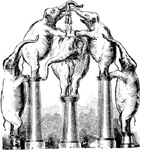
Is Democracy a Transcendent Good?
DICTATORSHIP OF THE LOWEST COMMON DENOMINATOR
How has a movement dedicated to the promotion of moral order in the public square, known broadly as “mainstream conservatism,” come to advocate ideas and policies that traditionally characterized its opponents’ worldview and objectives? There is an obvious consensus between both ends of the mainstream political spectrum concerning “democracy” and “freedom,” but conservatives rarely question or analyze the underlying assumptions and meaning of these terms. Used as rhetorical devices to elicit moral outrage or concern, appeals to these concepts as “values” have become emblematic of an abstract discourse that was once idiosyncratic of leftist theory but is now common to conservative rhetoric as well. This has resulted in a transformation of conservatism’s worldview and, in some respects, even inverted its domestic policy agenda.
Conservatives reflexively welcome any news that the power of a communist or totalitarian state is challenged. Their sympathetic treatment of pro-democracy protesters in the former British colony of Hong Kong is, therefore, unsurprising. While the recent turmoil resulted from threats to Hong Kong’s legal and administrative autonomy, many conservative commentators seem to have forgotten that reunification with mainland China in 1997 occurred in an air of ethnic solidarity. Two journalists who covered the handover ceremony for Tharunka, the student paper of the University of New South Wales, noted the reluctance of the locals to communicate in English during the festivities. Raj Kunman and Sungwon Steven Lee reported on the “unexpected and somewhat alienating experience” in which a “slight feeling of animosity permeated the streets.” They wrote that “the most irritating moment was when a taxi driver protesting an inability to speak English thrust a microphone into our faces so that we could speak to a translator, and, at the completion of our trip, asked for the fare in English.”
Those who proudly asserted their local identity and celebrated the lowering of the Union Jack 24 years ago are now displaying it in the streets as an act of defiance against Beijing’s authoritarianism. This irony has been brought to an end only through emergency measures designed to deal with the COVID-19 pandemic. Today, anti-communist enthusiasm among the right-leaning commentariat seems to have supplanted its memory of how the protesting dissidents arrived at their predicament. And it is here that we witness the transvaluation of conservatism in the face of social upheaval.
Though ethnic solidarity is a concrete, particular experience that the conservative mind should easily comprehend, the Hong Kong protestors took to the streets under the banner of “democracy,” an abstract concept denoting a system of governance and civic representation. To the democratic progressive, for whom political legitimacy is derived from the individual or popular will alone, this system provides its own moral justification; supporting democracy because it is democratic is, therefore, unremarkable, if absurd in its circular reasoning. In contrast, telos is at the heart of the conservative’s political orientation; freedom for what purpose and democracy to what ends should be questions that naturally arise. Sadly, what passes for conservatism today has almost entirely lost this purposive vector when orienting itself in the face of social and political controversy.
You May Also Enjoy
An Essay on the Development of Christian Doctrine. By John Henry Newman.
Ed. Note: On…
Even the stork in the heavens knows her times; and the turtle dove, swallow, and…
The Church is the true spiritual mother -- women are her symbol. We must also appreciate the true Fatherhood of God -- earthly fatherhood is the symbol of Him.

